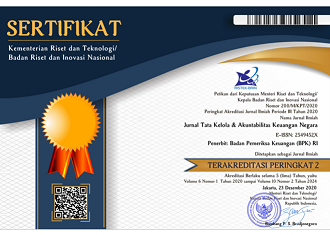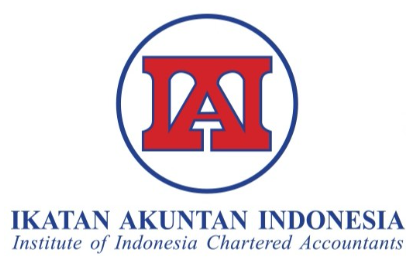DEVELOPING ETHICAL BEHAVIOURS AT BPK THROUGH HUMAN RESOURCE MANAGEMENT PRACTICES
DOI:
https://doi.org/10.28986/jtaken.v1i2.27Keywords:
code of ethics, ethical behaviours, human resource management, ethics audit, and ethical climate surveyAbstract
According to the 1945 Constitution, the Audit Board of the Republic of Indonesia (BPK) has an important role in fostering good governance and combating corruption in Indonesia's public sector through its audit works. To be successful, BPK must implement and enforce ethical behaviors within the organization. There are laws and regulations (e.g., code of ethics of civil servant and employee discipline) and systems, policies, and practices set up by authorities at BPK (e.g., BPK's code of ethics, whistle-blowing procedure, the Honourary Council of BPK's Code of Ethics (MKKE), and ethics training) that regulate and influence behaviors of employees and members of the board. When reviewing the literature, this paper attempts to understand the antecedents of ethical/unethical behaviors in organizations and look for best practices (including human resource management practices) in developing ethical behaviors in organizations. It turns out that the ethical frameworks within BPK have strong theoretical support. Despite the strong theoretical support from the literature, this study attempts to identify gaps between the best practices and ethical frameworks within BPK. In response to the gaps, this study attempts to offer recommendations so as to close the gaps and improve the ethical frameworks within BPK. In the end, this study produces seventeen recommendations.
Abstrak
Berdasarkan Undang-undang Dasar 1945, Badan Pemeriksa Keuangan Republik Indonesia (BPK) mempunyai peran penting dalam meningkatkan tata kelola pemerintahan yang baik dan memberantas korupsi di sektor publik di Indonesia melalui kegiatan pemeriksaannya. Agar sukses dalam mencapai tujuan tersebut, BPK harus menerapkan dan menegakkan perilaku etis di dalam organisasi. Ada undang-undang dan peraturan peraturan (contoh: kode etik Pegawai Negeri Sipil (PNS) dan peraturan disiplin pegawai) dan sistem-sistem, kebijakan-kebijakan, dan praktik-praktik yang dibentuk oleh pihak yang berwenang di BPK (contoh: kode etik BPK, prosedur pelaporan pelanggaran (whistle-blowing procedure), Majelis Kehormatan Kode Etik BPK (MKKE), dan diklat-diklat yang berkaitan dengan etika PNS dan kode etik BPK) yang mengatur dan mempengaruhi perilaku pegawai dan anggota badan. Ketika meninjau literatur, tulisan ini mencoba untuk memahami penyebab-penyebab perilaku etis/tidak etis di dalam organisasi dan mencari praktik-praktik terbaik (termasuk praktik-praktik dalam manajemen sumber daya manusia) yang dapat digunakan untuk mengembangkan perilaku etis di dalam organisasi. Berdasarkan hasil tinjauan literatur, kerangka etis yang ada di BPK ternyata mempunyai dukungan teoritis yang kuat. Terlepas dari dukungan teoritis yang kuat tersebut, studi ini bertujuan untuk mengidentifikasi kesenjangan antara praktik-praktik terbaik dengan kerangka etis yang ada di BPK. Sebagai respon terhadap kesenjangan tersebut, studi ini juga bertujuan untuk memberikan rekomendasi-rekomendasi yang mana diharapkan dapat menutup kesenjangan tersebut dan meningkatkan kerangka etis yang ada di BPK. Pada akhirnya, studi ini menghasilkan tujuh belas rekomendasi.
References
Baker, T. L., Hunt T. G., & Andrews M. C.. (2006). Promoting ethical behavior and organizational citizenship behaviors: The influence of corporate ethical values. Journal of Business Research, 59, pp. 849-857.
BPK. (2007). Standar pemeriksaan keuangan negara (State finance auditing standards). Jakarta: The Audit Board of the Republic of Indonesia.
BPK. (2008a). Petunjuk pelaksanaan sistem pemerolehan keyakinan mutu (Guidelines on quality assurance system). Jakarta: The Audit Board of the Republic of Indonesia.
BPK. (2008b). Panduan manajemen pemeriksaan (Audit management guidance). Jakarta: The Audit Board of the Republic of Indonesia.
BPK. (2009a). Cetak biru pengembangan sumber daya manusia BPK (BPK's human resource management plan). Jakarta: The Audit Board of the Republic of Indonesia.
BPK. (2009b). Standar kompetensi perilaku pegawai Badan Pemeriksa Keuangan (BPK Behavioural competency standards). Jakarta: The Audit Board of the Republic of Indonesia.
BPK. (2010). Rencana Strategis BPK 2011- 2015 (BPK Strategic planning 2011- 2015). Jakarta: The Audit Board of the Republic of Indonesia.
BPK. (2011a). Keputusan Sekjen BPK no. 507 tahun 2011 tentang penanganan pelaporan pelanggaran (whistleblowing) di lingkungan BPK (The decree of BPK's Secretary General no. 507 year 2011 on the handling of infringements (whistle-blowing) at BPK). Jakarta: The Audit Board of the Republic of Indonesia.
BPK. (2011b). Rencana implementasi Renstra BPK 2011-2015 (The implementation plan of BPK's strategic plan 2011- 2015). Jakarta: The Audit Board of the Republic of Indonesia.
BPK. (2011c). Peraturan BPK nomor 2 tahun 2011 tentang kode etik Badan Pemeriksa Keuangan (BPK regulation no. 2 year 2011 on BPK's code of ethics). Jakarta: The Audit Board of the Republic of Indonesia.
BPK. (2014). Keputusan Sekjen BPK no. 139 tahun 2014 tentang petunjuk pelaksanaan penilaian kinerja pelaksanaan pemeriksaan padapelaksana BPK (The decree of BPK's Secretary General no. 139 year 2014 on the implementation guidelines on appraising auditors performance). Jakarta: The Audit Board of the Republic of Indonesia.
Braun, V., & Clarke, V. (2006). Using thematic analysis in psychology. Qualitative Research in Psychology, 3 (2), 77-101.
Djurkovic J., & Maric, R. (2010). The influence of human resource management on the improvement of business ethics. Perspectives of Innovations, Economics & Business, 4 (1), 77-79.
Fine, S., Horowitz, I., Weigler, H., & Basis, L. (2010). Is good character good enough? The effects of situational variables on the relationship between integrity and counterproductive work behaviors. Human Resource Management Review, 20, 73-74.
GOI. (1975). Peraturan pemerintah nomor 21 tahun 1975 tentang sumpah/janji Pegawai Negeri Sipil (Government regulation no. 21 year 1975 on oath/ pledge of civil servants). Jakarta: The Government of the Republic of Indonesia.
GOI. (2004). Peraturan pemerintah nomor 42 tahun 2004 tentang pembinaan jiwa korps dan kode etik PNS (Government regulation no. 42 year 2004 concerning the development of spirit of the corp and code of ethics of the civil servant). Jakarta: The Government of the Republic of Indonesia.
GOI. (2006). Undang-undang nomor 15 tahun 2006 tentang Badan Pemeriksa Keuangan (Law no. 15 year 2006 concerning the Audit Board of the Republic of Indonesia). Jakarta: The Government of the Republic of Indonesia.
GOI. (2010). Peraturan pemerintah nomor 53 tahun 2010 tentang disiplin Pegawai Negeri Sipil (Government regulation no. 53 year 2010 on employee discipline). Jakarta: The Government of the Republic of Indonesia.
Kemenpan RB. (2014). Peraturan menteri pendayagunaan aparatur negara dan reformasi birokrasi nomor 52 tahun 2014 tentang pedoman pembangunan zona integritas menuju wilayah bebas dari korupsi dan wilayah birokrasi bersih dan melayani di lingkungan instansi pemerintah (Menpan RB regulation no. 52 year 2014 on guidance for establishing integrity zones towards clean and corruptionfree zones in goverment agencies). Jakarta: Ministry of State Apparatus and Bureaucracy Reform.
Liamputtong, P., & Ezzy, D. (2005). Qualitative research methods. United Kingdom: Oxford University Press.
Loyd, H. R. & Mey, M. R. (2010). An ethics model to develop an ethical organisation. SA Journal of Human Resource Management/SA Tydskrif vir Menslikehulpbronbestuur, 8(1), Art. #218, 12 pages. DOI: 10.4102/ sajhrm.v8i1.218.
Martinko, M. J., Douglas, S. C., Harvey, P., & Gundlach, M. J. (2007). Understanding and managing organizational deviance. In W. Gilliland, D. D. Steiner, and D. P. Skarlicki (Ed.), Managing Social and Ethical Issues in Organizations (pp. 253-293). Greenwich, Connecticut: Information Age Publishing.
Menzel, D. C. (2007). Ethics management for public administrators: building organizations of integrity. United States of America: M. E. Sharpe, Inc.
Nankervis, A., Compton, R., & Baird, M. (2008). Human resource management: strategies and processes. 6th ed. South Melbourne, Victoria: Thomson Learning Australia.
Schminke, M., Ambrose, M. L., & Neubaum, D. O. (2005). The effect of leader moral development on ethical climate and employee attitudes. Organizational Behavior and Human Decision Processes, 97, 135-151.
Schumann, P. L. (2001). A moral principles framework for human resource management ethics. Human Resource Management Review, 11, 93-111.
Utami, C. M. (2012). Penyelenggaraan program layanan Employee Care Center (ECC) di kantor pusat Badan Pemeriksa Keuangan Republik Indonesia (The establishment of Employee Care Center (ECC) at BPK's Head Office in Jakarta). [Bachelor thesis]. Depok: University of Indonesia.
Valentine, S. (2009). Human resource management, ethical context, and personnel consequences: A commentary essay. Journal of Business Research, 63, 908-910.
Wells, D., & M. Schminke. (2001). Ethical development and human resources training: an integrative framework. Human Resource Management Review, 11, 135-158.
Downloads
Submitted
Accepted
Published
How to Cite
Issue
Section
License
Copyright (c) 2015 Jurnal Tata Kelola & Akuntabilitas Keuangan Negara

This work is licensed under a Creative Commons Attribution-ShareAlike 4.0 International License.

Jurnal Tata Kelola dan Akuntabilitas Keuangan Negara is licensed under
a Creative Commons Attribution-ShareAlike 4.0 International License




















